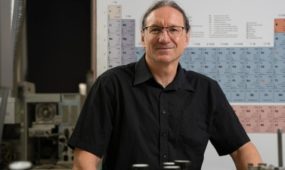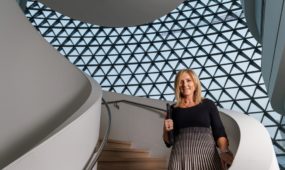Moving to Australia with a blind leap of faith
Education
THE idea of packing up your life and moving to another country is daunting for most people, but when you’re young and have a physical disability the task can require an immeasurable amount of courage.

Sign up to receive notifications about new stories in this category.
Thank you for subscribing to story notifications.
Upon meeting Razlan Mukhtar, a blind 21 year-old Malaysia national studying a Bachelor of Business Design and Innovation at the University of South Australia, you quickly realise he has been overcoming obstacles and barriers his entire life.
The way he talks about navigating traffic in Kuala Lumpur and the food stalls on the footpath in his hometown of Penang makes it sound like child's play.
But when he recalls the way he came to Australia in pursuit of the course of his dreams, it's hard to describe it as anything short of miraculous.
In July this year, Razlan was offered a place at the University of South Australia in Adelaide, but he needed find $150,000 AUS (the equivalent of 460,000 ringgit) in two weeks to make it happen.
He began applying for student scholarships, but with time against him, the Malaysian community, politicians and businesses rallied around him and came up with the total sum
Yap Soo Huey, a local MP called a press conference asking the general public to donate what they could, while Maxis, a local telecommunications company, agreed to pay for his university fees and living expenses.
The Universiti Teknologi MARA in Shah Alam, bought Razlan his plane ticket and the president of the Penang Botanic Gardens offered to pay for an electronic braille display device to assist him with his study in Australia.
“Here the pathways are free from any barriers so anyone including people with a visual impairment can walk safely and freely.” Razlan Mukhtar
“I am feeling very thankful. It makes me feel quite proud actually,” said Razlan talking about the culture of giving in Malaysia.
When Razlan arrived in Adelaide, he had just a few days to orientate his way around the city, memorise the path to the University's campus and settle into his student accommodation before classes started.
“I was incredibly nervous about him coming to Australia, because of the short time frame,” recalls Jayne Ayliffe, the University's disability advisor.
“But he was quite amazing. He was only shown a couple of times how to get from his apartment to the University and he got himself there independently on the Monday morning,” she said.
Ayliffe introduced Razlan to the staff at the Australian Royal Society of the blind who facilitated his orientation, and met with his lecturers to ensure his course material was provided in electronic form.
She said, like most universities in Australia, the University of South Australia has a range of facilities for people with a disability, such as adaptive technology suites with screen readers, extensive braille signage and additional security services for students with late classes.
“And he did have a couple of late classes, so we linked him up with the security staff here who accompany students to the bus and got him using the campus safety app, just in case he had any difficulty.”
In the last four months, Razlan has taken up swimming at the Aquatic Centre once a week.
He plays Goal Ball for a local team and hopes to join the national team next year.
He's also recently moved into a house with friends further out of town, and enjoys taking evenings walks around the city after class.
“It's really convenient for me to get around here.
“I am not scared of crossing a road here, compared to Malaysia where even though there is a crossing light for pedestrians, there will be something like a motorcycle or car or bus stopping right under the light.”
“Here the pathways are free from any barriers so anyone including people with a visual impairment can walk safely and freely, and that is very good,” he said.
But the move down under hasn't been without its challenges.
Unlike Penang where the streets are lined with stalls selling delicious treats, Australia's food prices have pushed Razlan into the kitchen.
“I've had to be brave against the fire,” he said, laughing about his early attempts at cooking.
After setting off the smoke detector and meeting a few of Adelaide's metropolitan firemen, Razlan has mastered a couple of dishes – ones his mum would be proud of.
“I love to fry anchovies and I work with vegetables a lot,” he said.
“I always tell my mum about how the weather here is different compared to Malaysia and how I feel very excited to experience four seasons here.”
Razlan said while his course has been “quite tough” the attitude of his Australian peers is very relaxed.
“Just walking around, sometimes I listen to people or talk to people and I find Australians have good stress management,” he said.
“I can easily communicate with Australian people because they are trained to understand my accent.”
Whether Razlan is playing sport or learning to cook a new dish, “he just really embraces life,” said Ayliffe.
“He makes the most of every opportunity he has, but he also tries to create those opportunities for himself.
“And he has a wicked sense of humour to match, so do have a lot of fun,” she said.
“She's like my mother,” said Razlan speaking about his relationship with Ayliffe.
“She's a good one. We have contact at least once a week.”
Looking to the future Razlan said he hopes to travel around Australia when he finishes his course.
“I am happy here. I think I am more independent and accepted here, and I can participate in more events.
“I am able to meet people from all around the world, not just Australians, and that is a new experience for me,” he said.
Jump to next article



